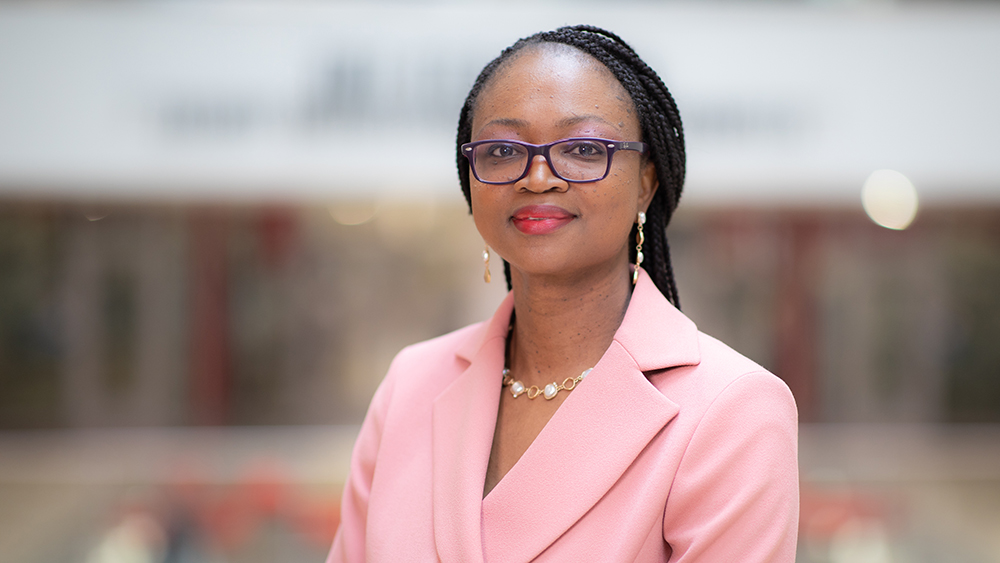
Dr. Rita Esuru Okoroafor, assistant professor and faculty member in the Harold Vance Department of Petroleum Engineering at Texas A&M University, will co-instruct the department's newest course this fall: PETE 489, Carbon Capture Utilization and Storage. The course represents an exciting direction for the department's undergraduate curriculum.
Okoroafor and Dr. Maria Barrufet, professor and Baker Hughes Endowed Chair in petroleum engineering and affiliated faculty in chemical engineering, will collaborate on teaching the material since it requires interdisciplinary instruction.
The following is an interview with Okoroafor, who shared both her experiences and her hopes for petroleum engineering students.
Q: What is your background?
A: I am a petroleum engineer by training and have spent approximately 15 years working in the oil and gas industry, primarily with SLB (formerly Schlumberger). However, I decided to expand my knowledge on energy resources and obtained a Ph.D. in geothermal energy from the School of Earth, Energy and Environmental Sciences at Stanford University.
Q: Is geothermal energy relatable to petroleum engineering?
A: I started without knowing anything about geothermal energy. But as I progressed in my research, I found many of the skills I had as a petroleum engineer were what I was using in geothermal research, so yes, geothermal energy is relatable to petroleum engineering in many ways. After I finished my Ph.D., I spent one year at Stanford University as a postdoc and was assigned to projects in carbon capture, utilization and storage, and underground hydrogen storage. Those were things I didn't really have knowledge about, but again my petroleum engineering skills fast-tracked most of my understanding of those projects.
That made me realize that we should not be afraid of the energy transition or the evolving energy mix because, as petroleum engineers, we have a role in each of these areas. Our skills are relevant in a vast majority of fields, including carbon capture, utilization and storage, geothermal energy and even offshore wind, solar energy and photoelectric membranes. We have a variety of skills that are transferable.
Q: How do you hope to impact the students at Texas A&M?
A: My role in the oil and gas industry was both technical and non-technical. In addition to my core petroleum engineering technical roles, my experience includes roles like project management, sales management and product development. Those experiences help me mentor and coach as I engage with students. I don't just offer technical advice. I let them know the non-technical skills they pick up here, such as critical thinking, problem-solving, perseverance and dedication, also apply to many things they do in life.
Q: What is it like being in the petroleum engineering department at Texas A&M?
A: I love the opportunity to share knowledge. I love that when I wake up in the morning and have a question I want to answer, I can look for ways of answering those questions through research. And I'm grateful for the support and mentorship I receive here. I also want to give support and mentoring to others, both in the department and outside it, and the department offers me the opportunity to give a lot of myself.
Q: What do you teach?
A: I'm currently teaching an undergraduate course on formation evaluation. Teaching formation evaluation comes from my experience as a borehole reservoir engineer at SLB. We looked at petrophysical data and combined it with reservoir data to gain a better understanding of formations.
Last semester, I taught a graduate course on subsurface engineering for sustainable energy, where we take the skills we already have in subsurface — such as fluid flow in porous media — and bring them in to understand both the subsurface behavior of geothermal reservoirs and the storage of carbon and energy in geological media. I plan to repeat the course this fall.
Q: Can you explain more about the new undergraduate course?
A: A lot of focus right now is on combining carbon capture — that is, capturing carbon dioxide (CO2) emissions from industrial plants, oil and gas operations, or any industry that releases carbon — and storing that carbon. The new course is for seniors because they are at a point where they have learned enough about petroleum engineering to understand carbon storage.
We will introduce students to where emissions come from and how to quantify them. We will explore the thermodynamics of CO2 and how we compress, transport, utilize and store it. We will look at different storage mechanisms and delve into geological media storage because we feel it has the best capacity to store CO2 in large quantities. We will also expose the students to regulations, policies and incentives and how they evolve. We will help them understand the economics of carbon capture storage (CCS) projects, what they have been, what they look like now with new policies and where they should be going.
Q: What do you hope the students will gain?
A: We want our students to be versatile, knowing what they should know as petroleum engineers yet being able to fit into these new areas related to decarbonization. Let's say an oil and gas company wants to hire our students and has a department that deals with storage. Our students can fit into such a department. If our students want to perform CCS research or start a decarbonization company, they will be able to because they have that fundamental knowledge. We want to equip them with confidence.